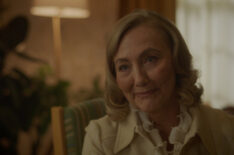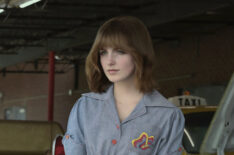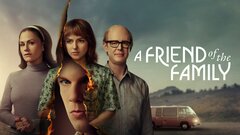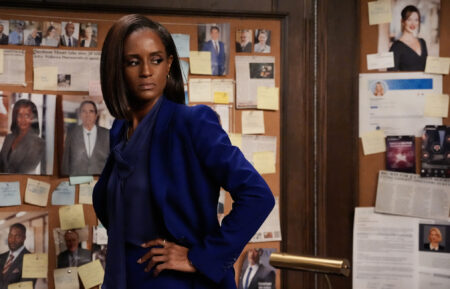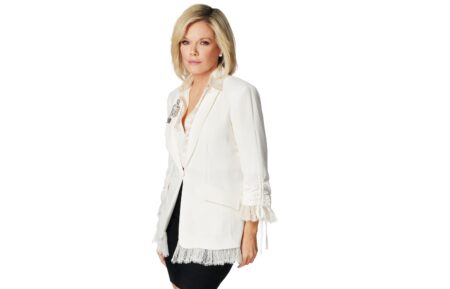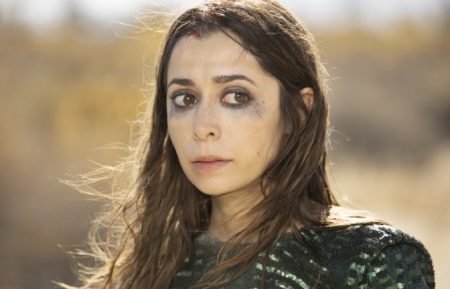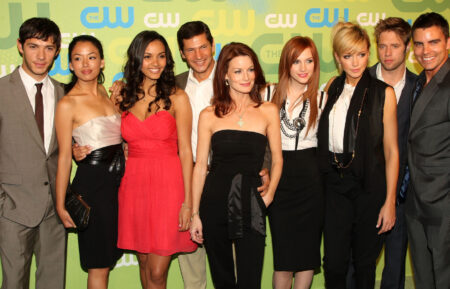‘A Friend of the Family’ Finale: Jake Lacy Talks B’s Downfall & Mckenna Grace’s Impressive Performance
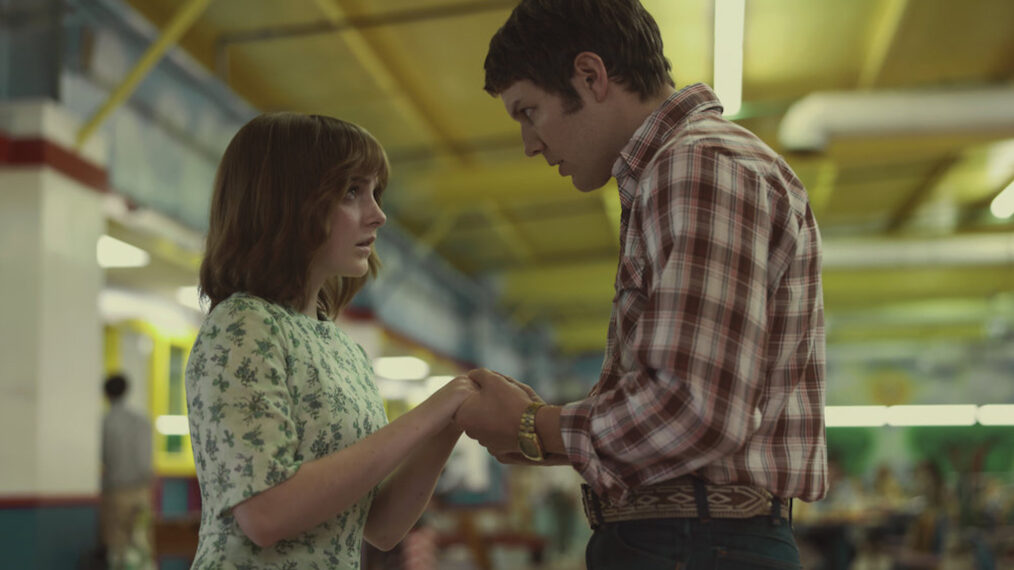
Q&A
Jake Lacy brought the insidious predator Robert “B” Berchtold to life in A Friend of the Family. And in the finale, we finally see B’s world crumble around him. All of the Brobergs — Mary Ann (Anna Paquin), Bob (Colin Hanks), their daughters, and eldest daughter Jan (Mckenna Grace) — reunite as a family and begin their healing journey.
Unfortunately, Berchtold served little time admitted to a psych ward as his legal punishment. During this time, he continued to groom new families and children and would continue to do this for decades until killing himself in 2005.
Here, Lacy breaks down B’s downfall and looks back on the Peacock limited series.
We talked previously about there being no way to humanize Berchtold. With that in mind, what were some of the thoughts running through your head about him while you were making the finale? I was yelling at my screen when he acted sick of Jan [Mckenna Grace] at his trailer.
Jake Lacy: There are really two scenes. That one, in particular, I think we shot some elements of that, trying out a few different ways. So the lipstick, I’m sort of jolted by it because she looks like the young woman that she is and not like a child, which is grotesque to talk about. I wipe it off of her mouth, and it has this physical aggression to it. There’s one [take] where she wipes it off, and then I take the handkerchief and clean it up a bit more. And then there’s a much simpler one where the threat is in the tension of “what’s gonna happen here, and why are you talking to me like this?” which I think is enough.
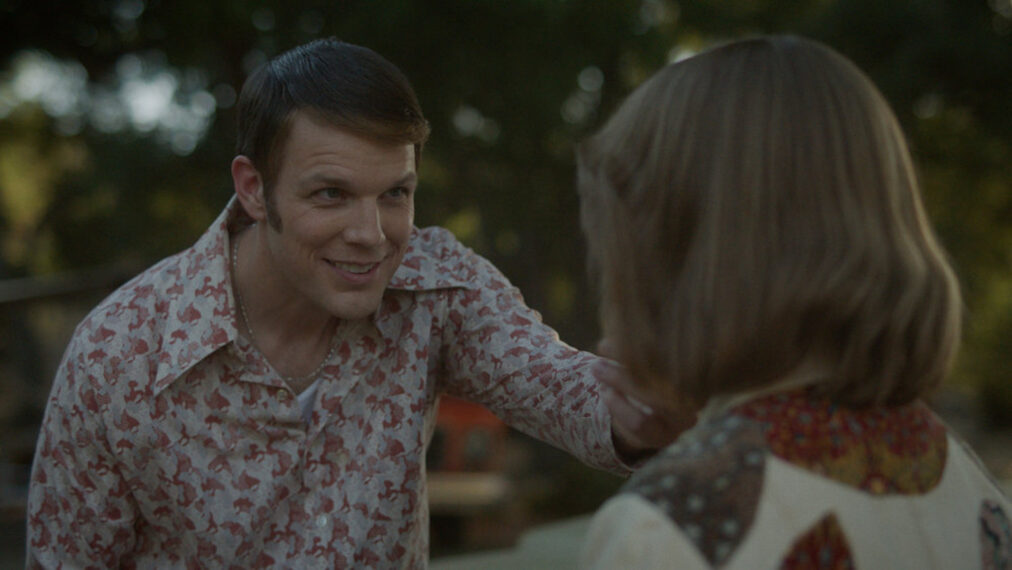
Peacock
That in itself is terrifying when someone directly calls you out on your appearance and then forces you to change it, and they’re in their 30s, and you’re 15. And then, at the end when she leaves, there’s a handful of takes where we play Berchtold as genuinely sad that this is ending, that it’s over in a way for him, or at least at this moment, it’s over in his mind.
We did what he had hoped for. Jan [Broberg] was nodding along [in conversation with showrunner Nick Antosca] as well, and I was like, “Oh, we got it.” There’s times where Berchtold really thought he was in love with Jan and that they were soulmates and he’d do anything for her. And there’s other times where she’s purely an object of desire for him to take and control by any means necessary. I don’t know if he always knew, which was because sometimes he’s using this, “I love her, I love you,” whatever it is to get his way. And other times, I think he thinks he truly is saying, “This is the love of my life, how dare you?” Neither of which is OK, obviously. But just in terms of the humanizing element, it’s like, is he really feeling something here, is this always a manipulation, or does he not know at times?
I wonder if that is just what love looks like to him? That objectification, that obsession. And that makes it worse.
That would be problematic and unhealthy between two adults, and then this is 10 times worse because it’s a child. I’m not sure he knows what love actually is. And when there’s a 20-year difference, you think, “this is horrific.” This is why we put these people in jail.
What did you think of seeing the real Jan Broberg playing her own therapist in the finale?
I think it’s beautiful. Her performance is fantastic. She’s an actor as well, and it’s wonderful to have her be a part of it in that way. She has done years of therapy and work and has been of service to people, and that has been the true healing. It’s not participating in this that has been the final healing moment, but it is just a surreal and beautiful thing to have her talking to Bob and saying, “There’s a path to healing, and it starts here,” or to speak to young Jan. It’s just a beautiful thing outside of [the] narrative structure and Hollywood bullsh*t and whatever else we can pack onto it.
It’s so poignant because she truly knows they will be OK eventually. I talked to her last week, and we talked at length about this scene. I found it very moving when she was talking about talking to Colin Hanks as her dad, Bob Broberg, who died in 2018.
The family’s response to Colin as Bob is a really beautiful thing, just on a human level. We were at the premiere, and Mary Ann [Broberg] was there sitting right in front of me with Jan and her sisters. When Colin would come on screen, Mary Ann would grab Jan’s hand and go, “Oh, there’s my Bobby.” For anyone who has gone through any loss of someone you love, to get to see them in some kind of beautiful fun house mirror reality world, to see them alive again is just beautiful.
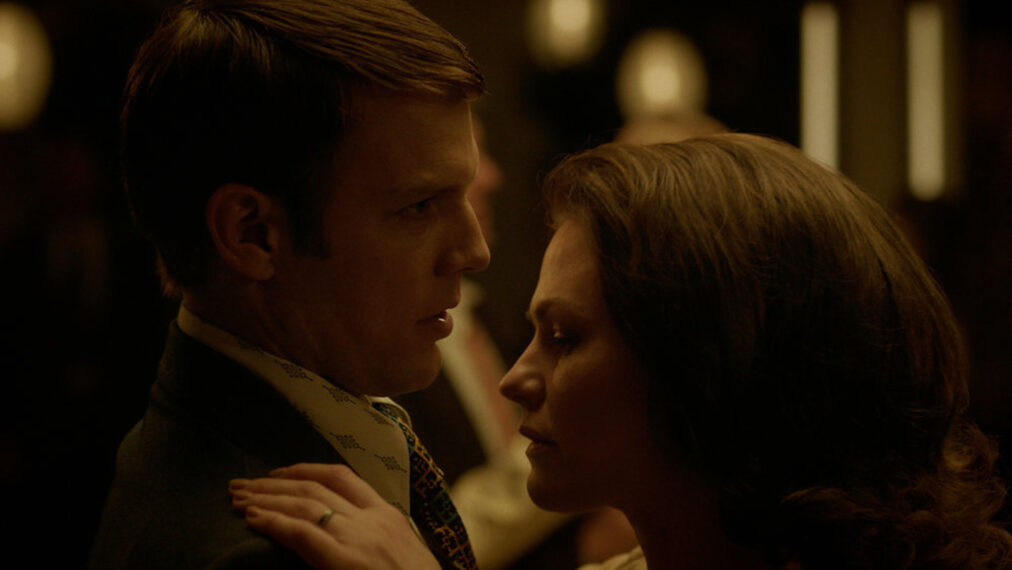
Peacock
I love the finale scene in the car with Anna when you’re both reaching for the guns. Do you have a favorite scene with her from the whole season?
Oh, it might be that one. Fun is a dangerous word to throw around with this job, but some of the fulfilling scenes for me are where Berchtold is not getting his way. His charm offensive — or whatever manipulation he thinks he’s got someone in a corner with — doesn’t work out, and you start to see his ease crack.
That, to me, is so fun as he tries to negotiate internally how to get his way, what to do next, and maintain the veneer of “it’s all gonna work out for me.” And so between having him eating these pancakes and her having zero interest in this story about Carly and the hippies, hard-cutting to “let’s take a walk,” and then getting her in the car and immediately trying to make it intimate, that gets him nowhere. And so he then hard-cuts back into “sign the papers,” then he threatens her. The whole way, she is rock-solid. He finally has no option but to be like, “Get the f*** out of my car.”
When she threatens him, it’s like he is forever attempting to expand his space and control in his world. And so anytime that people hem him in, you see a flare-up of “you don’t run the show, I run the show,” including there where he’s desperately not getting his way, and she’s like, “I’m coming for you.” It is more than he can handle.
In the moments when he’s not getting his way, I noticed an acting choice you made was you’d panic for a second, and then you’d dissociate back into his typical mode kind of thinking. Was that your way of showing that snap back into “this will work out for me” mode? Does he believe that, or is he trying to convince himself nothing’s wrong?
He’s forever performing, I think. If on that walk across the street between the phone booth and his car, even though his entire world is in the balance of whether he can get to the motor home to get his things and get to California in time, if a neighbor had stopped and said like, “Oh, Bob, you seem kind of rushed,” he would’ve stopped and taken two full minutes to say, “Well, I’m just trying to get here. How you been?”
He understands the cost of not keeping up that appearance, and so I think underneath he’s seething, but knows [it’s] best, [if] he can, at all costs, keep that “aw shucks, it’s gonna be fine” [energy], because that puts other people at ease. I don’t think it’s for appearances. I don’t think he’s self-soothing with it. The only self-soothing he does is get power, [and] having control. I think that’s the time when he feels like he can breathe. It’s always about controlling [the] perception of others [to] make the space to get what he wants.
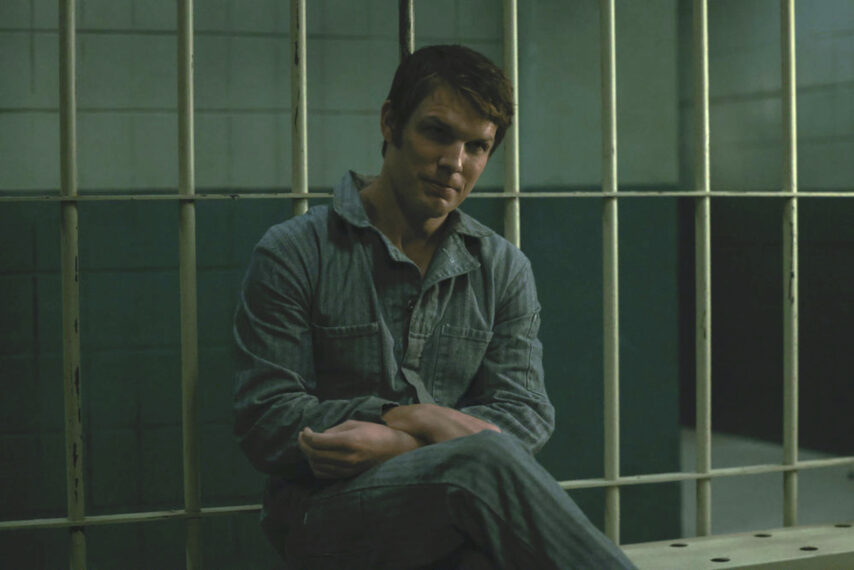
Peacock
Were you playing it as he knew he was losing control or was he convinced that he was just so good at this?
It’s the first and then the second. He is clearly cognizant of this charm not working the way it did for the first six months, 12 months, 18 months of knowing the Brobergs. He knows that’s faltering but also thinks he could have success with these new tactics.
There’s an incredible shot that Steven Piet set up for, maybe it’s Episode 5, but Mary Ann’s come to my motor home, and I come outside and say, “What are you doing here?” She says, “From now on, I just need to be with my family, and we need to take some space.” I come down the steps and say, “Oh, Mary Ann, don’t make me beg,” and just walk right up to her. Then we just stand there as she is trying to be firm. Steven was like, “Just stand there and smile and don’t do anything.” They push from across this dirt track all the way in, and the entire time you see, Mary Ann falter and turn back to the car. It worked.
He has such power over this woman that just being in his warmth and his presence at that time in her life brings her back into the fold, and eventually, even that tactic falls away. You get to that café scene where he’s hitting her with everything he’s got, and she’s strong and intentioned and grounded and isn’t gonna fall for it.
I was really impressed with Mckenna’s acting in the finale. She’s ridiculously good for her age.
I would say for any age. I just think she’s fantastic.
What scene with Mckenna is most memorable for you?
One is when we’re at the fun center, and my family’s there. I pull her aside and essentially propose to her, and Jan/Mckenna is juggling knowing what B is asking, being absolutely petrified, feeling like she has this responsibility to Zeda and Zethra and an entire planet of people, a need to do the right thing. She’s far from home, he’s the only person that she knows and trusts. She’s juggling so many things, and then Jan makes the choice as a performer to play the part.
It isn’t Jan saying yes, it’s this alternate Jan saying, “I’ll be the leading lady.” To watch a 16-year-old Mckenna play Jan playing a different Jan is a level of nuance and accomplishment that many people twice her age would not do as well.
A Friend of the Family, Streaming Now, Peacock

